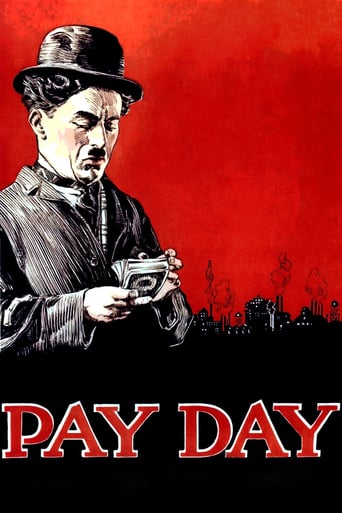Michael Morrison
In a brand-new upload at YouTube, this is a must-see, especially for Chaplin fans -- and surely everyone is: https://www.youtube.com/watch?v=ZDxNsaain5gStrangely, I had never seen this before, and it is very gratifying to find a Chaplin movie that is "new" to me.One reviewer said "Pay Day" was Chaplin's favorite, among his shorts, and I think he had many better, but this is often astonishingly creative fun.The story is not even slight. It's almost non-existent: Mostly a series of vignettes -- but very funny vignettes.It really doesn't end, just stops. Still, it's Chaplin, and funny, so do see it, and I hope you see it with the Lasky Famous Players Orchestra at https://www.youtube.com/watch?v=ZDxNsaain5g.There is one flaw in the music, and I've asked Scott Lasky about that, but, pish, it in no way detracts. Enjoy.
Horst in Translation ([email protected])
This may be the short film from Charlie Chaplin, in which he plays the most tragic character of his career. At work, he's hungry and needs to steal his co-worker's lunch. He's married to a considerably older, not even remotely attractive gold-digger wife, who's a pest to poor old Charlie. And finally, when he receives the paycheck, which is as low always, and tries to hide it, the wife takes it away immediately. No surprise the little man goes to the bar at night to drink away his sorrows. When he decides to get home, all the trains are packed and Charlie repeatedly attempts to hop on one, but here he comes as short as everywhere else. So after a long walk through the rain, he finally reaches the dragon's cave and as the alarm clock rings, the dragon makes sure in resolute fashion that Charlie (without food and sleep) gets to work early in the morning again.I feel most Chaplin short films haven't aged too well, but this one is an exception, mainly thanks to Phyllis Allen, whose characters interactions with Chaplin are a joy to watch. The scenes with the two are easily the highlight, i.e. the return from work and the scenes right at the end. She's truly sinister and I wouldn't have minded if she had starred in a couple more Chaplin films. The construction work scenes early on were okay. The pub scenes were the weakest part of the film, although the butcher wagon was kinda funny. I believe this is one of the better Chaplin short films and a good start to get in the legendary silent actor's body of work.
MartynGryphon
Given that this was Chaplin's last ever movie short, he couldn't have ended this stage of his career on better from, as this movie is a triumph in every way and is widely regarded as one of Chaplin's best, (a view shared by Chaplin himself who, in his twilight years, named Pay Day as the favourite of all his short films made between 1914 and 1922.I find that when reviewing shorts such as this,it's most important that you don't rattle on longer than the movie itself, so I'll make this as brief as I can.Chaplin plays a labourer on a building sight who after an hilarious day on the job, gets paid , gives his rolling pin wielding wife the slip and goes for a night on the town.Sweet Edna Purviance plays the foreman's daughter and gives another one of her adorable performances, but it's such a shame that she's not given more to do.I cannot end the review without mention to the brilliant, yet simple, brick throwing scene, where it appears that the workers on the ground are chucking bricks up to Charlie on the scaffold, where he is gracefully catching them and stocking them for use. We all know that the film is being run backwards, but in 1922, this scene must have had the convulsed audience throwing their pop corn all over the theatre such was it's originality, as that was my very reaction when I first saw the sequence.My other favourite moment is just after Charlie and his drinking buddies leave the saloon, (or speakeasy as it must have been, as the movie was actually made during prohibition). When putting on his overcoat, Charlie puts his right arm in his own coat, put manages to find his left arm in the right arm sleeve of the coat belonging to the gentleman standing behind him and proceeds to get dragged down the street while the other man remains completely ignorant of his new Charlie papoose.I have seen about 40 of all the 50 Chaplin shorts made, and can say with confidence that with the exception of perhaps 'One AM'(1916) and 'Shoulder Arms' (1918), none of them even come close to Pay Day.Enjoy!
MartinHafer
This film has some highly imaginative and well-timed stunts--all revolving around Charlie's job at a construction site. All the near-falls and accidents remind me of Sweet Pea from POPEYE cartoons--as the baby is nearly killed again and again but miraculously escapes. In Chaplin's case, it involved a funny sequence when he ALMOST falls down an elevator many times, dropping objects accidentally on those below and a really interesting sight gag involving guys throwing bricks up to Charlie who catches this with complete ease (it was done by running the film backwards). Later, Charlie's hideous and scary wife is introduced and it goes from a work comedy to a domestic one. In a way, this was a minor disappointment, as I preferred the faster paced work stunts, but all-in-all this is a funny and well executed short.



